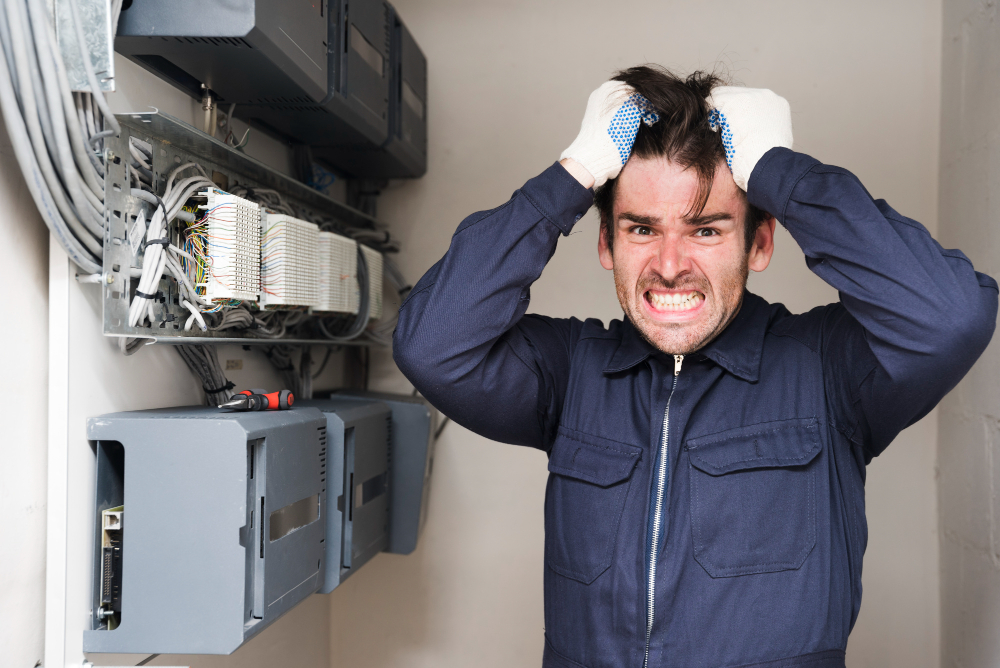It’s common for homeowners to make small, seemingly inconsequential mistakes that can cause safety hazards for their families. Electrical systems should not be taken lightly, and any changes require consultation with a licensed electrician.
Safe electrical practices and rules and regulations by the Energy Market Authority (EMA), Singapore, have been introduced to prevent electrical hazards like fires, electrocution, and expensive repairs. As a responsible homeowner, you must avoid these five common electrical mistakes that most people make and protect your family.
1. Overloaded circuits
Plugging multiple high-wattage appliances or extension cords in the same outlet can draw out more power than it can handle. Overloading lines can cause the electrical system to overheat, resulting in short circuits, appliance damage, and fires. Frequent fuses are a clear indicator of overloaded circuits and must not be ignored.
To avoid this, you must:
- Spread your electrical consumption towards different outlets within the house.
- Prevent using multiple high-wattage appliances from the same outlet.
- Unplug appliances that are not currently in use.
- Increase the number of outlets in the house if that’s the reason behind the need to overload.
- Use a surge protector with built-in circuit breakers.
2. Using Wrong Wattage Lightbulbs
Most people know how to replace a lightbulb and are quick to DIY it when needed. It makes sense, too. Why call an electrician for something so trivial? However, when replacing a lightbulb, it’s essential to stay within the wattage requirement of the electrical fixture to avoid overheating.
If you use a bulb that requires more power than the socket is designed to provide, it will inevitably overheat and can become a fire hazard. It is a common electrical mistake and quite dangerous.
To avoid this, you must:
- Check the wattage allowed for an electrical fixture, as mentioned on the socket.
- Buy a light bulb within the wattage range.
- Use LED lights since they consume less power and produce less heat.
- If the wattage range on the fixture is not visible, it is on the safer side to stay within 60 watts.
3. Neglecting Grounding and GFCI Outlets
A GFCI (Ground Fault Circuit Interrupter) outlet is a safety device that cuts off electrical power when it detects an electrical hazard like faulty wiring, overheating sockets, water damage, and so on. These are installed in areas of the house where water is being used, like the kitchen or bathroom.
While you might not even notice your GFCI outlet on a daily basis, it plays a key role in protecting your family from electrocution, shocks, and burns. Neglecting a faulty GFCI outlet or forgetting to install it altogether is throwing caution to the wind and placing your home’s electrical safety at risk.
To avoid this, you must:
- ‘Test’ and ‘Reset’ your GFCI outlet once a month to ensure it is functioning properly.
- Get a GFCI installed or repaired.
- If you’ve got an old home, book a consultation with an electrician to troubleshoot and assess the condition of your GFCI outlet.
4. Outdated or Poorly Installed Wiring
This common electrical mistake takes root in the mindset that electrical systems don’t need regular maintenance. People go decades without getting their old wiring checked. They ignore warning signs like flickering lights, frequent circuit breaker trips, random sparks, and slight burning smells that may come from outlets when devices are plugged in. Suddenly, when the wiring gives up, they are dumbfounded.
To avoid this, you must:
- Schedule periodic consulting with a trusted electrician.
- Replace aluminum wiring with modern copper wiring.
- Never hide open electrical connections behind a wall.
- Do not fall prey to unlicensed electricians doing shoddy and shady renovation jobs.
5. DIY Electrical Repairs
You are not Superman. Electrical work requires licensing for a reason. It is to prevent electrical fires and electrical wiring mistakes. It’s okay to DIY some projects, while others must strictly be left to the experts. Please understand that DIYing electrical jobs can lead to more than costly repairs; they’re a safety hazard.
To avoid this, you must:
- Book an electrician’s services when you need them.
- Resist the urge to DIY.
Say No To DIY Electrical Repairs
Remember, you and your family’s safety are more important than a few dollars. In this time and age, scheduling repairs and consulting with an electrician is affordable and easily accessible. If you need help with your electrical system, let us take care of it for you.
At Fixlaa, we connect homeowners with reliable, licensed, and trusted electricians who prioritize your family’s safety and follow safe home electrical practices. They can troubleshoot your electrical system, inspect circuits and outlets for damage, and reset your safety devices to keep them up and running.
They would also be happy to run you through the best practices for home electricity maintenance so that you can avoid dangerous and common electrical mistakes.
At Fixlaa, we got you covered, laa. If you need electrical repairs, click here. To learn more safe home electrical practices and get free home care tips, stay tuned to our blog.


